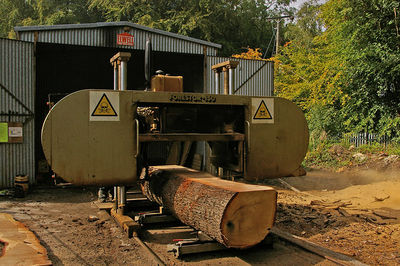Bandsaw: Difference between revisions
Jump to navigation
Jump to search

No edit summary |
m (→See Also) |
||
| Line 16: | Line 16: | ||
=See Also= | =See Also= | ||
*[http://en.wikipedia.org/wiki/Bandsaw Wikipedia:Bandsaw] | *[http://en.wikipedia.org/wiki/Bandsaw Wikipedia:Bandsaw] | ||
*[http://opensourceecology.org/wiki/Sawmill OSE:Sawmill | |||
{{GVCS Footer}} | {{GVCS Footer}} | ||
Revision as of 07:59, 13 November 2012
| Bandsaw | ||
|---|---|---|
| Home | Research & Development | Bill of Materials | Manufacturing Instructions | User's Manual | User Reviews | 
| |
Overview

A bandsaw cutting lumber. Thanks to: geograph.org for the CC licenced image.
A bandsaw is a power tool which uses a blade consisting of a continuous band of metal with teeth along one edge to cut various workpieces. The band usually rides on two wheels rotating in the same plane, although some bandsaws may have three or four wheels. Bandsawing produces uniform cutting action as a result of an evenly distributed tooth load. Bandsaws are used for woodworking, metalworking, or for cutting a variety of other materials, and are particularly useful for cutting irregular or curved shapes, but can also be used to produce straight cuts. The minimum radius of a curve that can be cut on a particular saw is determined by the width of the band and its kerf.
Details
Status
The bandsaw is currently in the prototype phase of design.
See Also